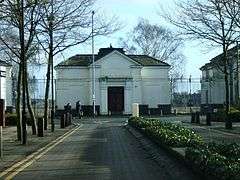IMI plc
|
| |
| Public company | |
| Traded as | LSE: IMI |
| Industry | Engineering |
| Founded | 1862 |
| Headquarters | Birmingham, England |
Key people |
Lord Smith (Chairman) Mark Selway (CEO) |
| Revenue | £1,751.0 million (2017)[1] |
| £239.2 million (2017)[1] | |
| £162.2 million (2017)[1] | |
Number of employees | 10,670 (2017)[1] |
| Website | www.imiplc.com |
IMI plc (LSE: IMI), formerly Imperial Metal Industries, is a British-based engineering company headquartered in Birmingham, England. It is listed on the London Stock Exchange and is a constituent of the FTSE 250 Index.
History
The Company was founded by Scottish entrepreneur George Kynoch who opened a percussion cap factory in Witton, West Midlands in 1862, trading as Kynoch.[2] The business soon diversified, manufacturing goods ranging from soap and bicycle components to non-ferrous metals, but by the early 20th century it had developed particular expertise in metallurgy.[2]After World War I it merged with Nobel Industries.[2] In 1926 the Company acquired Eley Brothers, an ammunition business.[3] The Company, by then known as Nobel Explosives, was one of the four businesses that merged in 1927 to create Imperial Chemical Industries.[2] The Witton site became the head office of ICI Metals.[2] During the Second World War the Witton site was used for the development and production of uranium for the Tube Alloys project.[4]
In the 1950s the company's researchers perfected the process for producing titanium on a commercial basis.[2] In 1958 ICI Metals bought 50% of Yorkshire Imperial Metals: it acquired the other 50% four years later.[5]
The name Imperial Metal Industries Limited (IMI for short) was adopted on the 100th anniversary of the firm in 1962.[2] The Company was listed on the London Stock Exchange in 1966.[2] Initially ICI retained a majority holding, but in 1978 IMI became fully independent.[2] In the 1990s the Company disposed of its more basic businesses such as metal smelting and metal founding.[2]
In 2003, IMI moved from the Witton site to new headquarters close to Birmingham Airport.[6]
The company announced in October 2013 that a decade-long programme of transformation had been completed with the disposal of two non-core subsidiaries to Berkshire Hathaway for £690m.[7] The disposal of the Cornelius Group, a beverage-dispensing machine business, together with the disposal of a marketing intelligence business, would enable the company to focus on its control valve making business.[8]
Business platforms

The company now has three business divisions:[9]
- Critical engineering: Critical engineering division
- Precision engineering: Precision engineering division
- Hydronic engineering: Hydronic engineering division
References
- 1 2 3 4 "Annual Report 2017" (PDF). IMI. Retrieved 26 March 2018.
- 1 2 3 4 5 6 7 8 9 10 "History". IMI. Retrieved 10 March 2014.
- ↑ "About us". Eley. Retrieved 10 March 2014.
- ↑ The Pre-Harwell Era. New Scientist. 15 August 1957.
- ↑ "I.C.I. and Yorkshire Copper Works", The Times, 4 January 1958, p. 12
- ↑ Records of IMI [Imperial Metal Industries] PLC and subsidiary companies, 1865–1973, Walsall Local History Centre (Reference Code: 1000)
- ↑ "IMI boss says decade-long transformation complete". The Telegraph. 16 October 2013. Retrieved 10 March 2014.
- ↑ "Berkshire Hathaway buys UK's IMI". The Telegraph. 17 October 2013. Retrieved 10 March 2014.
- ↑ "Our businesses". IMI. Retrieved 10 March 2014.